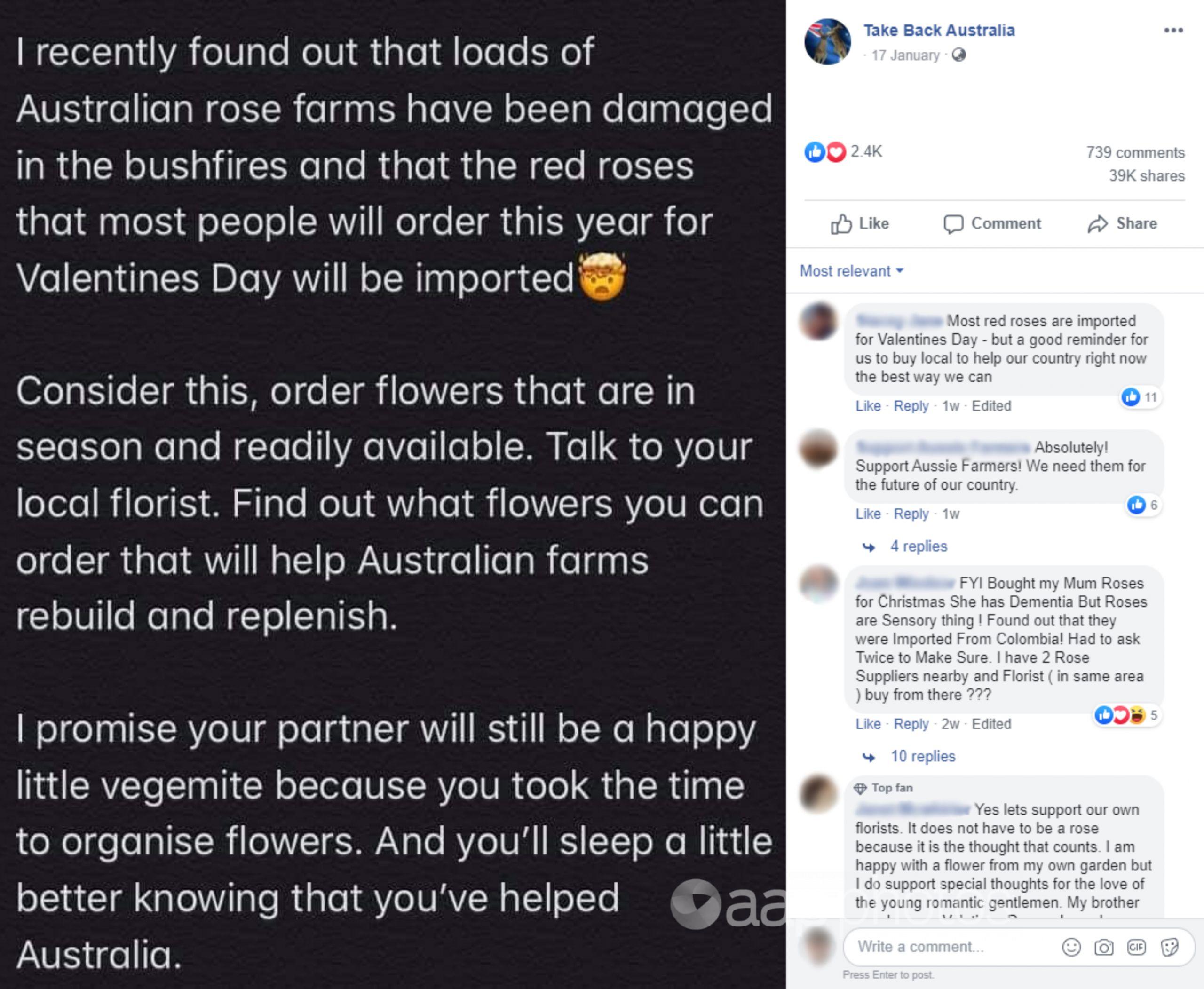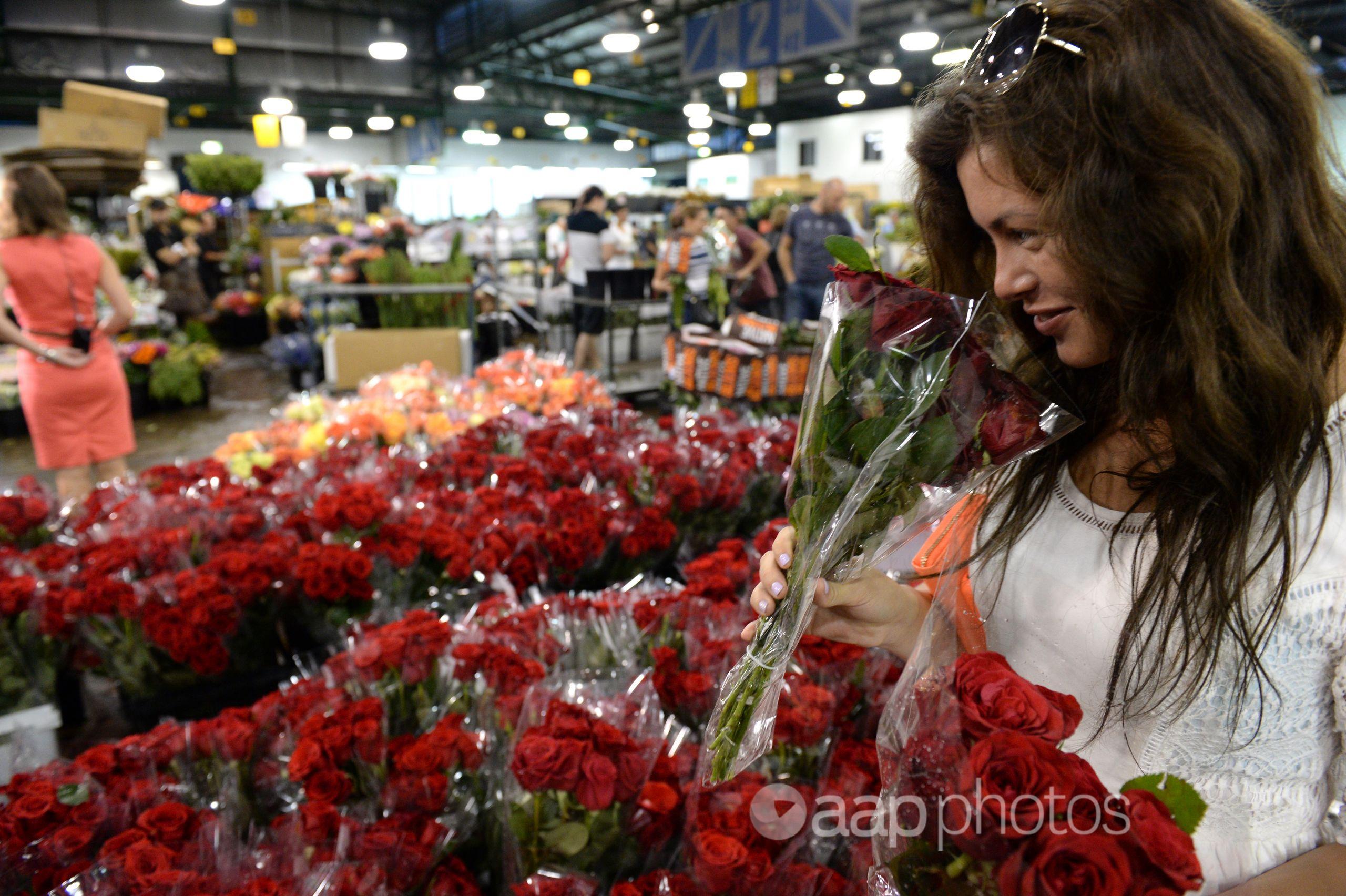The Statement
As Valentine’s Day approaches, a claim is spreading that Australian rose farms have been damaged by bushfires and so most of the nation’s romantic roses will be imported.
The January 17, 2020 Facebook post on a page called Take Back Australia reads: “I recently found out that loads of Australian rose farms have been damaged in the bushfires and that the red roses that most people will order this year for Valentines (sic) Day will be imported”.
The post continues, “Consider this, order flowers that are in season and readily available. Talk to your local florist. Find out what flowers can you order that will help Australian farms rebuild and replenish”.
The post has been shared more than 39,000 times and seen by more than 200,000 people. It has attracted more than 2,400 reactions and 700 comments.

The Analysis
Major bushfires have been burning around Australia since September 2019, scorching millions of hectares along the east coast of Australia and claiming more than 30 lives.
Fires affected large coastal and inland areas in Victoria, NSW and southern Queensland.
A Department of Agriculture, Water and the Environment spokesman told AAP FactCheck in an email that the department was “not aware of any commercial rose growers impacted by the recent bushfires” and it did not expect “a significant increase in rose imports this year compared to previous years”.
Victoria is a major source of Australian-grown fresh-cut flowers, accounting for 30 per cent of the nation’s cut flower production.
Bushfires have burned through the Gippsland region in the east of the state but Victorian Farmers Federation Vice President Emma Germano said no Flowers Victoria members had been affected by the fires.
“To the best of our knowledge, no (Victorian) commercial rose growers have been impacted,” she said in an email to AAP FactCheck.
Ms Germano told AAP FactCheck the majority of roses currently available in Australia are imported from overseas.
Flowers Victoria is a branch of the Horticulture Group of the Victorian Farmers Federation and is a lobby group for flower growers and farmers in Victoria.
Shane Holborn, the former executive officer of now-defunct industry body Flowers Australia, told AAP FactCheck that most Valentine’s Day roses sold in Australia are not grown locally, with Kenya and Colombia the two largest supplier countries.
“About 80 per cent of roses sold in Australia for Valentine’s Day are imported,” he said.

Mr Holborn said a majority of Australian rose growers had gone out of business over the past 10 years as imported flowers have become cheaper.
He said most of the rose growers would be clustered near cities and towns.
“I would be surprised if more than a handful have been affected (by bushfires),” he said.
“I know that some flower growers have been affected but it would be more the native ones out in regional areas.”
Delwyn Thomas, a horticulturalist and co-author of a professional flower guide produced by Australia’s Rural Industries Research and Development Corporation, said she had not heard of rose growers being affected by bushfires.
“I’ve spoken to some rose growers of late and their biggest concern was about the drought,” Ms Thomas said.
Ms Thomas said local rose growers had begun importing roses to counter the cost of heating and cooling greenhouses out of season but the import trade has grown “bigger and bigger” over the past decade.
The Verdict
Based on the evidence, AAP FactCheck found the post to be partly false. The claim that bushfire damage will result in most Valentine’s Day roses being imported is not true. According to experts and industry groups, rose farmers have not been affected by the recent bushfires. However, it is true those same experts told AAP FactCheck the majority of roses sold in Australia are imported as has been case for at least a decade.
Partly False – The claim of the content is a mixture of accurate and inaccurate, or the primary claim is misleading or incomplete.
* AAP FactCheck is accredited by the Poynter Institute’s International Fact-Checking Network, which promotes best practice through a stringent and transparent Code of Principles. https://factcheck.aap.com.au/
All information, text and images included on the AAP Websites is for personal use only and may not be re-written, copied, re-sold or re-distributed, framed, linked, shared onto social media or otherwise used whether for compensation of any kind or not, unless you have the prior written permission of AAP. For more information, please refer to our standard terms and conditions.

















